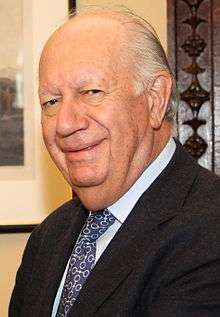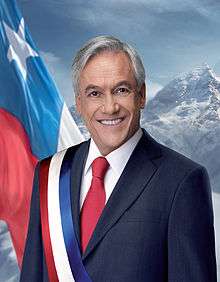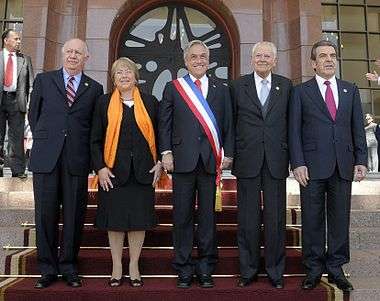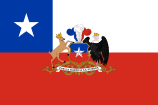President of Chile
| President of the Republic of Chile | |
|---|---|
|
| |
| Style | His/Her Excellency |
| Residence | No official residence |
| Seat | La Moneda Palace |
| Term length | Four years, not eligible for re-election immediately |
| Inaugural holder | Manuel Blanco Encalada |
| Formation | June 9, 1826 |
| Succession |
Minister of the Interior (as Vice-President) |
| Website |
www |
 |
| This article is part of a series on the politics and government of Chile |
| Comptroller General |
| Constitutional Court |
|
The President of the Republic of Chile (Spanish: Presidente de la República de Chile) is the head of state and the head of government of the Republic of Chile. The President is responsible for both government and state administration.[1] Although its role and significance has changed over the history of Chile, as well as its position and relations with other actors in the national political organization, it is one of the most prominent political figures. It is also considered as one of the institutions that make up the "Historic Constitution of Chile", and is essential to the country's political stability.[2]
Under the current Constitution (adopted in 1980), the President is elected to serve for a period of four years, with immediate re-election being prohibited. The shorter period (previously the term was six years) allows for parliamentary and presidential elections to be synchronized. The official seat of the President of Chile is the La Moneda Palace in the capital Santiago.
Features of the office
Requirements
The Constitution of 1980 and its consecutive amendments (2005), establishes the requirements for becoming President. Originally the President must be a natural-born citizen of the country. The President must also be at least 35 years old. In addition, all the requirements for becoming a Senator apply. The president must meet all the requirements to qualify as a fully Chilean citizen with the right to vote. Those are who have reached the age of eighteen years and who have never been sentenced to afflicting punishment. The loss of the right to vote (in case of interdiction on grounds of insanity, being tried for a crime deserving afflict punishment or for a crime that the law should define as a terrorist conduct, or in case of punishment by the Constitutional Court in conformity with Article 8 of this Constitution) is the main disqualification for the applicant.
In the 2005 constitutional reform, some of these requirements were changed:
The President now must have the Chilean nationality (being a natural-born citizen of the national territory or being born overseas and accredit that one of the parents or one of the grandparents is a Chilean national).[3] The President must also be at least 35 years old.
Election
Article 26 detail the electoral requirements. The President shall be elected by direct ballot, with an absolute majority of the votes validly cast. A two-round system is used. In order to win the election in the first round, the winning candidate's party must receive more than 50 percent of the valid votes leaving out of the count blank and spoiled votes.
The election shall be held the third Sunday of November of the year immediately before the end of the administration of the President then holding office. Should there be more than two candidates in the presidential election, none of them obtaining more than half of the votes validly cast, a new election shall be held. The second election ("balloting"), in the manner determined by law, shall be held the fourth Sunday after the first election, limited to the two candidates with the highest relative majorities. Then, the candidate with the majority of valid votes in that round is elected president.
Term duration
Under the 1828 constitution, the President served for four years, without the possibility of immediate reelection for one more term. In 1833, the presidential period was changed to five years, with a possibility of immediate reelection for one more term, limited to two consecutive terms. Then by a constitutional reform in 1878, possibility for reelection became disallowed. Under the 1925 constitution, the President served for a six-year term, without the possibility of immediate reelection only.
In the original text of the 1980 constitution, the President served for an eight-year term without the possibility of immediate reelection. Some transitory disposals, fixed during the government of the general Augusto Pinochet, allowed the exceptional possibility of his reelection in the 1988 plebiscite. Then, in the transition to democracy the 1989 referendum established a first transitional four-year presidential term (1990-1994), followed by common eight-year terms, without the possibility of immediate reelection. However, in March 4, 1994 (a week before Eduardo Frei Ruiz-Tagle took office) the presidential period was reduced to a six-year term, without an immediate reelection.
Under the 2005 constitutional reform, the President serves for four years without the possibility of immediate reelection for one more term. A former president may run for office once again after serving their initial term, but only in an election following their successor, as it is not allowed to run for consecutive terms. There is no limit to how many times a person can run for candidacy if they have not previously served as President.
The Incumbent president, in accordance with the constitution, completes their corresponding term on March 11 of the immediate year after the election. The President-elect takes office the same day.
Living former Presidents
There are four living former Chilean Presidents:

Eduardo Frei Ruiz-Tagle
(served 1994–2000)
June 24, 1942
Ricardo Lagos
(served 2000–2006)
March 2, 1938
Michelle Bachelet
(served 2006–2010/2014–present)
September 29, 1951
Sebastián Piñera
(served 2010–2014)
December 1, 1949


.jpg)
See also
References
- ↑ See Sentencia Rol 78-1989 of the Constitutional Court of Chile, relapsed on the Central Bank of Chile's Constitutional Act project (declarations Nº 7 to 13).
- ↑ Bravo Lira, Bernardino (1996). "Introducción. Raíz y razón del Estado de derecho en Chile". El Estado de Derecho en la Historia de Chile. Santiago, Chile: Ediciones Universidad Católica de Chile.
- ↑ http://chile.gob.cl/en/consulados/tramites/para-chilenos/documentos/nacionalidad/
External links
- (in Spanish) Presidencia
